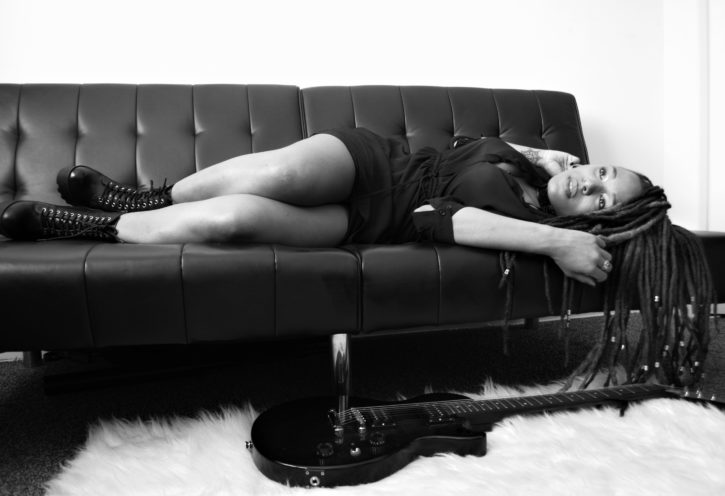
Lately, I have been reading a lot about Hillary Clinton's plan to put the treatment of mental health in America on par with physical health. At the end of August, Hillary said her initiatives will focus not only on early detection of mental illness but also prevention. And that sound's great, right?
YOU MAY ALSO LIKE: Black Children & Suicide Prevention: A Call To Action
It would be awesome if the government made a priority of mental illness and made help accessible to everyone. However, as someone who was released from a psychiatric hospital only two months ago, I believe we DO NOT need the current mental illness treatment model to be more accessible, because the system is currently broken.
Being admitted to a mental health facility does not automatically mean that a person is "crazy." At any given time you are equally as likely to find someone there who has no history with mental illness as someone who has battled it all their life. For those of us whose issues have gotten so bad that we are considered "a threat to yourself or others," these facilities are the only hope we have left.
I am opening up about my personal experience to raise awareness about the need for change.
My first suicide attempt was September 11, 2015. I'd lost a baby and developed postpartum, and became increasingly worse until I could no longer cope. I was not taken to the hospital at that time, or after my two subsequent attempts. The thing is, once you cross the line and make an attempt to end your life, once you lose consciousness and actually experience the peace of feeling nothing, your healthy fear of death fades. That makes recovering from being suicidal extremely hard.
Two months ago, standing alone in my apartment in Chicago, I realized if I did not get help immediately I was not going to make it through the night. I took a cab to the emergency room, they processed me and found a psychiatric hospital that wasn't full and accepted my insurance, and they sent me in an ambulance to a facility that was over an hour away from my friends and family.
Life Inside A Psychiatric Hospital
When a patient is admitted to a psychiatric hospital, they have The Right to Petition for Discharge. This requires signing a document that us patients referred to as a "5 Day." Within five days of signing the document, the doctor is legally obligated to see you, diagnose you, and treat you. If you no longer meet the specifications for needing to be hospitalized then they have to either discharge you or petition a court for why you should stay longer.
The hospital I was in did not tell patients about the 5 Day at the time of admission. And when we asked for it the staff threw Jedi mind trick levels of shade to discourage us from signing. When you finally do sign, it does not become active until the day AFTER you submitted it. Weekends and holidays don't count toward your 5 days. So yeah. The struggle was dishearteningly real.
I was told during intake that I was being sent to "the nicest ward," one that was part of a new program focused on treating high functioning women. Each patient is assigned a doctor and a social worker, and we are supposed to meet the doctor within 24 hours of being admitted. It took mine 36 hours before he saw me, and he spent less than eight minutes alone with me before recommending the three medications I am currently taking: Klonopin, Doxepin,and Paxil.
In the state of Illinois, patients have a right to "Informed Consent," which means that before a person agrees to undergo a medical procedure or receive any medication, he or she has been told and fully understands the risks and benefits of the treatment and any alternatives to it. I was not informed that the meds could possibly turn me into a zombie.
I've never drank or done drugs in my life. I've never even smoked weed, so my body was not ready. I could not think straight or speak coherently when I took the meds. I would fall asleep and groan out loud uncontrollably. I was also not informed that me having an adverse reaction to the meds would result in me getting more days in the hospital.
I have been hospitalized twice in my life: once in my teens and again two months ago. Both times, I had to fake like I was taking my meds to get out. As a kid I learned that refusing meds in a psychiatric hospital resulted in an extended stay. As an adult, I was so eager to get better that I was willing to actually give medication a try. I'd even asked them to lower my dosage, but that was still too strong for me.
It's really hard to focus on your recovery when the process itself can rob you of your freedom and autonomy. So I started doing something called "cheeking," which is when you hide the meds between your gum and cheek so that when the nurse who administered the meds checks under your tongue it will look like you swallowed them. Because we had no privacy, disposing of our meds was dangerous. If you got caught throwing them out, or if you stashed them and they were found during an unexpected "sweep" (which is a polite word for raid) you could get more days.
Our ward was clean and colorful, and despite being freezing cold all the time, the environment was pleasant. When I interacted with patients from other wards, though, they explained just how different "the nicest ward" was from the others. A few people told me that theirs was just like that movie "One Flew Over the Cuckoo's Nest."
All of the wards shared the same cafeteria that we visited three times a day for meals. As someone who has been vegan for 16 years, I was so disappointed by the cafeteria. They feed patients so much processed food that is not nutrition dense, and if you have a special dietary need like vegan or gluten free items you can expect to be eating the same food everyday, at every meal. Almost everyone in my ward either had diarrhea or constipation daily.
And I can't lie, the cafeteria workers did try hard to accommodate my diet, they did genuinely care. But the fact is, if a hospital is going to have a contract with a corporation to supply food, the Standard American Diet should not be the basis by which these hospitals choose what items should be fed to people who are in recovery when we know that the standard diet, full of sugar and refined starches, can actually make the symptoms of mental health issues worse.

The biggest disappointment about my recent stay in the psychiatric hospital was the fact that we did not get individual therapy. The longest I saw my psychiatrist during my stay was that eight minutes in which he prescribed my meds the day after I arrived. Despite the fact that the state of Illinois upholds each patient's right to an individualized care plan, the only therapy we received were group therapy sessions where we discussed our personal issues amongst other patients.
The fact that young people of color made up less than a third of our ward pretty much made the idea of Culturally Competent Care impossible. I was not told when I was admitted that the hospital was a "dual diagnosis" facility which meant that some of the people on my ward were there specifically because they were recovering from chemical dependency. It was bad enough that we weren't allowed to keep our toiletries in our rooms because a recovering alcoholic might sneak in and drink them, but the mixed environment also made it tough for everyone's issues to get addressed in group.
We often wondered why women were allowed on our "ward for high functioning women" who did things like throw themselves on the ground and scream at the top of their lungs or cut their self with sharpened plastic spoons smuggled from the cafeteria.
There were times when group therapy was great because talking with the other women provided the validation and support that many of us had been missing. But most of the group therapy sessions were generic and just helped us kill time.
Each group session lasted an hour, and they were scheduled back to back from early morning until an hour before our 9 p.m. mandatory bedtime. Group therapy was "optional," but if you didn't go you could be noted as showing "anti-social behavior" and get more days.
Most of us went to group because we had no other mentally stimulating activities. All of the books available to read were from the late nineties, and none were on topics like self-help or recovering from mental illness. The only entertainment aside from the tv we shared in the Day Room were copied pages of adult coloring books. I don't know how most of us could have made it without the coloring books. We could not have writing pens to journal with, so we had to use Crayola Markers.
Much of the hospital's staff were friendly, caring, and helpful, and really worked to make a difference in our lives. However, others were overworked and cranky, displaying the stankest of attitudes if someone reminded them that their medication was late. They did not hesitate to threaten an irate patient with giving them a bad report that could get them more days.
One time a nurse wrote my vitals on another girl's medical chart and when she realized her error, the other girl and I got to see all of each other's personal medical info while she corrected it. It was wide in the open. They would do things like tell you that you're getting out on a certain day, then the day came and it wouldn't happen. I saw so many women crying over that.
We were all on meds; everybody got prescribed something. How is it possible that NOBODY in the ward had issues that could be treated simply with talk therapy? If we stepped out of line, they would give us extra days in the hospital as punishment. And if you got mad, if you did not want to go to group therapy all day or sit around and color, if you did not want to go down to the cafeteria where a guy from another ward might have his touchy-feely female ward mate come slip you his number, they would document your refusal and it could lead to you getting more days.
A mental health hospital should never feel punitive and isolating like that.
A Voice for the Voiceless
After a while I got pissed off and started speaking up. I asked why we were being given generic advice on coping skills that did not apply to our individual issues.
I asked why it was necessary for grown women to have a 9 p.m. bedtime.
I asked why access to the fitness area was being treated like an occasional privilege instead of being made a regular part of our recovery.
I asked why we had never met our floor director, why we could not have access to toiletries to wash up whenever we wanted to, why were we being treated like children.
I spoke up for older ladies who were being bullied by the staff. I interrupted group therapy sessions and directed it to issues that some of the quieter patients had really been wanting to talk about.
I complained about my ward mates being triggered by having a male staff member surveil us at night.
One day I organized all of the patients and we wrote down our complaints, documented things that happened that were breaches of HIPA and patients' rights, and submitted it formally, in writing.
And the next day I got released.
Now, I see a therapist on my own. I take the meds I was prescribed at a dosage that works for me and am looking into ways to transition off of them. My insurance does not cover any natural alternatives to meds so I have to pay for it myself.
I am still in recovery, and I stay in touch with the other ladies I was hospitalized with to support their recovery. We are all different races and from different walks of life, and if it hadn't been for the hospital we probably would not have met. Some are doing better than others, but all of us share a deep disappointment that comes from knowing that if things ever get really bad again, not even a psychiatric hospital can offer us a safe space. We have to get better because we have nowhere to go if we don't.
I have been speaking out about this because I promised I would tell our story. If "mental health" is about to be added to the list of new political buzzwords, let's speak up about actually making changes instead of taking the same dysfunctional model that is currently in place and making it available to everyone. Because that will actually drive people crazy.
If you or a loved one is in need of support, call the National Suicide Prevention Lifeline at 800-273-TALK.
 Nikki Lynette is a rapper, singer, producer, songwriter, visual artist, blogger and on-air personality. And a goddess with real locs. Follow her on Twitter @NikkiLynette.
Nikki Lynette is a rapper, singer, producer, songwriter, visual artist, blogger and on-air personality. And a goddess with real locs. Follow her on Twitter @NikkiLynette. 








